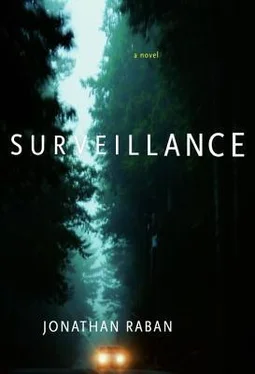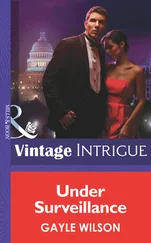Now, he read, he must learn to feel “compassion” for his anger. But he could no more feel compassion for it than he could turn himself inside-out like a sock. That he was too angry with his anger was the problem: he wanted to get his hands around its neck and throttle it to death, which was, as they said in the Buddha books, incurably bad karma. By 4:30, Tad was getting angry at the Dalai Lama. At five, he turned on the radio to listen to the news: suicide bomber kills thirty-six, White House defends new measures to combat terrorism…
Fuckers! Tad thought. Those guys are the fucking terrorists.
RELUCTANT as Lucy was to go back to Useless Bay for the weekend, she had to accept Augie’s invitation because Tad had forced her hand. Not to go would give the appearance of caving in to his ridiculous outburst on Sunday night. He hated Augie because he’d refused to demonstrate with his students against the war in Vietnam — so far as Lucy could see, that was the long and short of it, and his paranoid tirade about Augie’s “sadism” was just an attempt to settle an ancient political score. Either that or he was being babyishly jealous of Alida’s fondness for Augie. Whatever — they now had to go to Useless Bay. To do otherwise would be bad for Tad’s character.
Yet she was concerned. Tad’s increasingly odd behavior over the last few weeks was truly frightening. She looked anxiously for signs of weight loss, but on his inhibitors and whatnots he was deceptively pink, portly, and Pickwickian. When he came back with his wrist bandaged after the TOPOFF exercise, Lucy’s first appalled thought was Kaposi’s sarcoma — he’s hiding a lesion. Tad had always been chattily informative about things like his T-cell count and the changes in his cocktail of medications, but lately he’d brushed off her inquiries with I’m fine and My doc threatens to predecease me. What was really going on?
She was terrified by the thought of him dying, and not just on Alida’s behalf. Tad could be maddening, but he was her best and closest friend, the only person besides Alida whom she loved. She’d often thought wistfully that if only he weren’t gay, the best place to settle their absurd political disagreements would be in bed, where she could take him in her arms and exorcize his black fantasies with kisses. These fantasies arose, she was certain, from the loneliness of his life without Michael: Tad was someone made to need a partner to cherish him, a role that Lucy, had things been differently constructed, would have volunteered for at the drop of a hat.
The sight of his bandaged wrist had panicked her, but when the bandage was off the following day, what it concealed was exactly what Tad had said, a nasty scratch inflicted by an amateur actor with a shovel. Though she hadn’t said a word about it, the relief that swept through her was immense.
She loved him dearly, but he could not be allowed to get away with the outrageous performance he’d put on last night. So she called the Vanagses’ number and got Minna.
Augie was out birdwatching. “He’ll be so pleased — he likes to talk to you,” Minna said, her faint Mittel-Europa accent sounding more pronounced over the phone.
“What can we bring?”
“Yourselves only. Everything on the island’s so much fresher than in the city.”
“Wine?”
“You see Augie’s cellar? We are drowning in wine.”
After Minna’s openheartedness, it was with a feeling of unpleasant disloyalty that Lucy sat down to her assigned task for the morning, which was to read a truly false memoir of World War II — Binjamin Wilkomirski’s Fragments. No ordinary fraud, Mr. Wilkomirski, having persuaded himself that his childhood lay in the Nazi extermination camps, had produced a work of fiction that, before it was exposed by a Swiss journalist, had won prizes and international attention as a work of harrowing documentary fact. Could you tell just by reading the book, Lucy wondered, by studying the way the words fell on the page, that it was untrue? If so, could Boy 381 stand up to the same test?
Most reviewers had been taken in by Fragments, comparing Wilkomirski to Primo Levi and Anne Frank, though one or two had raised cautious doubts as to its authenticity. Then the Swiss journalist, Daniel Ganzfried, had come along, with the shocking news that Wilkomirski “knows Auschwitz and Majdanek only as a tourist.” The last thing that Lucy wanted or expected was to be Augie’s Ganzfried. In fact, she hoped very much that reading Wilkomirski would put her mind finally at rest about Vanags.
No doubt about it: there was something thin, stagy, melodramatic, unreal in the opening chapter of Fragments, where Wilkomirski’s father was killed on the third page.
No sound comes out of his mouth, but a big stream of something black shoots out of his neck as the transport squashes him with a big crack against the house.
She didn’t buy it — but might she have, had Ganzfried not blown a hole in Wilkomirski’s story? Was the alloy ring in the words themselves, or was it just the wisdom of hindsight that made them sound so readily disbelievable? The childish voice felt contrived to her, as Augie’s never did. Surely no child, watching his father, would see him as so deliberately childish a stick figure? The falsity was right there in the words, she was sure of it.
She read on:
There’s a station in my memory. We have to go through a barrier, papers are shown and looked at — maybe false ones.
Sighs of relief and we’re standing on a platform and it’s sunny—
“Land lord!”
That imperious knock: him again. Letting Mr. Lee into the apartment, she did her best to make nice, lavishly thanking him for his work on the shelves.
“No problem, no problem. Got new lock for you today. Security!” He held out a chunky piece of machinery, somewhat scratched, that had obviously led a previous life in another building.
“Mr. Lee, was it you who brought the t-tulips?”
“Tertelips?”
She pointed at the vase.
“Oh, flowers, yeah. Old ones all dead and crackly.”
“Well, how kind.”
“No problem.” He trailed an orange cable across the carpet and laid out a filthy sheet beneath the door.
“Can I get you coffee? W-w-water? Tea?”
“You make coffee, Lucy. That be great. Cream, no sugar.” He waved his power drill at the kitchen area, as if to dispatch her there.
It was astonishing that the replacement of a lock could make such a racket, and the electric tools whizzed and screamed as if a complete remodeling of the apartment was under way. When she took the coffee to him, he waved at her from behind a churring saw. She tried to return to Fragments, but the din made it impossible to read a line. In a momentary pause he called, “Good coffee, Lucy. How I like it — strong.”
“I’d better remember that,” she said.
“Don’t drink tea,” he said over the whine of a bared screwdriver.
It took him the best part of an hour to finish the job; then he made her try the lock.
“Terrific,” she said. “Fantastic.” What could one say about locks? “Very solid.”
“Keep you safe.”
“Thank you.”
He made no move to clean up his stuff and go, but just sat down on one of the chairs around the dining table. “So you a rider, Lucy. What kind of riding you do?”
“Oh…articles, mostly, for newspapers and magazines. I’m working on one now. Against a tight d-d-deadline, so I’m afraid—”
“Whaddaya write about?”
“People, places.”
“What people?”
“Sometimes celebrities, sometimes p-people nobody’s ever heard of.”
“I like to read. How ’bout you give me something to read what you wrote?”
Читать дальше












